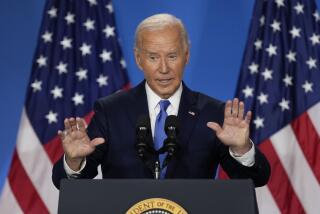Canadian Drug Inquiry Reaches Crucial Phase
- Share via
TORONTO — With a promise to expose the underworld of international track and field, the third--and most anticipated--phase of the Dubin Inquiry opened Tuesday.
It is so called in the Canadian press because Charles L. Dubin, Ontario chief associate justice, presides over the inquiry. To give the official name, Inquiry into the Use of Drugs and Banned Practices to Increase Athletic Performance, takes longer than it does Canadian sprinter Ben Johnson to run 100 meters.
Johnson, of course, was the Canadian government’s inspiration for assigning a commission to investigate international sport when he lost his gold medal for winning the 100 meters at the 1988 Summer Olympics after testing positive for an anabolic steroid. Gone with it was the world record of 9.79 seconds that he set that afternoon in Seoul.
Johnson’s coach of 11 years, former Canadian Olympic sprinter Charlie Francis of Toronto, was the only witness called Tuesday. In three hours and 45 minutes of gentle questioning by the commission’s co-counsel, Robert P. Armstrong of Toronto, Francis was not asked about drugs.
But Armstrong, who won respect for his tenacious grilling of witnesses in a previous government inquiry concerning a train derailment, indicated in his opening remarks that Francis and others, including athletes, doctors, Canadian and international Olympic officials and Johnson himself, will be expected to tell all they know about drugs. Francis may be on the stand through Friday.
“Things will be revealed that have never been revealed before,” he said, requesting that Dubin recommend limited immunity for some of the witnesses in anticipation that their testimony will be self-incriminating.
“I think that has merit,” Dubin said.
Although this is not a trial, Dubin has been empowered by the government to seek criminal prosecution if he believes it appropriate. Among athletes and coaches who were already suspended by various sports bodies, Johnson received by far the most severe penalty. Canadian sports minister Jean Charest suspended him for life from competing for national teams.
But Dubin reiterated Tuesday that the probe will not be limited to Johnson’s drug use. Since the hearings opened in November, they have covered a general overview of Canadian sport and a weightlifting drug scandal that occurred before the Olympics.
The inquiry is necessary, Dubin indicated, as a national catharsis for Canadians, who are attempting to learn more about the pressures that lead their athletes to use drugs. The hearings are being televised nationally on a cable channel.
“This is not an inquiry into the conduct of one or two people,” he said. “Little could be gained if we had such a narrow focus. We must look to the future.
“In the end, our objective is to advance the interests of Canadian athletes and to produce a healthy climate for them to compete both nationally and internationally.”
Dubin, 67, who resembles John Wooden, kept the mood in the rented office in downtown Toronto light Tuesday, often joking with Francis.
Apologizing for asking so many questions about an agent’s role with an athlete, Dubin said, “I never had an agent.”
“Maybe you’ll need one after this,” Francis said.
In the early ‘80s, Dubin presided over a high-profile investigation into airline safety in Canada. But this probe has received considerably more press attention. Besides all the major Canadian newspapers, several from the United States also are represented. Reporters from Europe and Japan are expected when Johnson appears, which probably will be in two or three weeks.
To avoid the dozen or so television cameras he knew would be situated in the lobby Tuesday, Francis, who lives in Toronto, stayed at a downtown hotel Monday night and arrived at the office at 7:45 a.m. for a 10 a.m. hearing. Appearing as if he had gotten little sleep, a haggard Francis appeared older than his 40 years.
Armstrong’s questions focused on Francis’ background as an athlete and coach. A Stanford University graduate who won three Canadian national championships in the 100 and 200, he began coaching in Toronto in 1976.
Over the next 12 years, he coached most of the country’s best sprinters, including Johnson, Desai Williams, Tony Sharpe and Angella Taylor Issajenko. He also coached high hurdler Mark McKoy. In recent years, he has been a national coach, paid by Sport Canada and Sport Ontario.
Francis never has admitted publicly that he knew of drug use among his athletes. Nevertheless, he was suspended for two years, with pay, after the Summer Olympics.
Francis’ testimony Tuesday was overshadowed by news reports of an article in the April edition of Runner’s World. Physical therapist Jack Scott of Berkeley, Calif., said that, while he was treating Johnson last year, Dr. Jamie Astaphan of the Caribbean island of St. Kitts told him that he had used steroids in his treatment of the sprinter.
Dubin chastised reporters for lending credence to comments made outside the hearing room, without the advantage of cross-examination, leading Astaphan’s attorney, David Sookram, to challenge Scott.
“Let him come and say it here, and I’ll be concerned,” Sookram said, adding that Astaphan will testify when called. “What he says outside, I’m not concerned about.”
More to Read
Go beyond the scoreboard
Get the latest on L.A.'s teams in the daily Sports Report newsletter.
You may occasionally receive promotional content from the Los Angeles Times.






